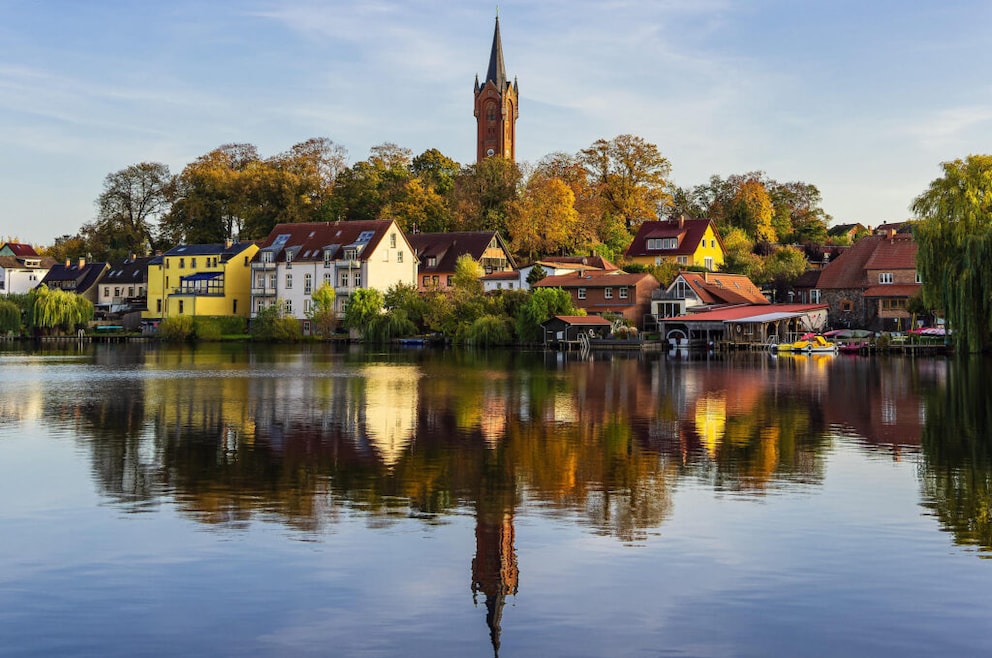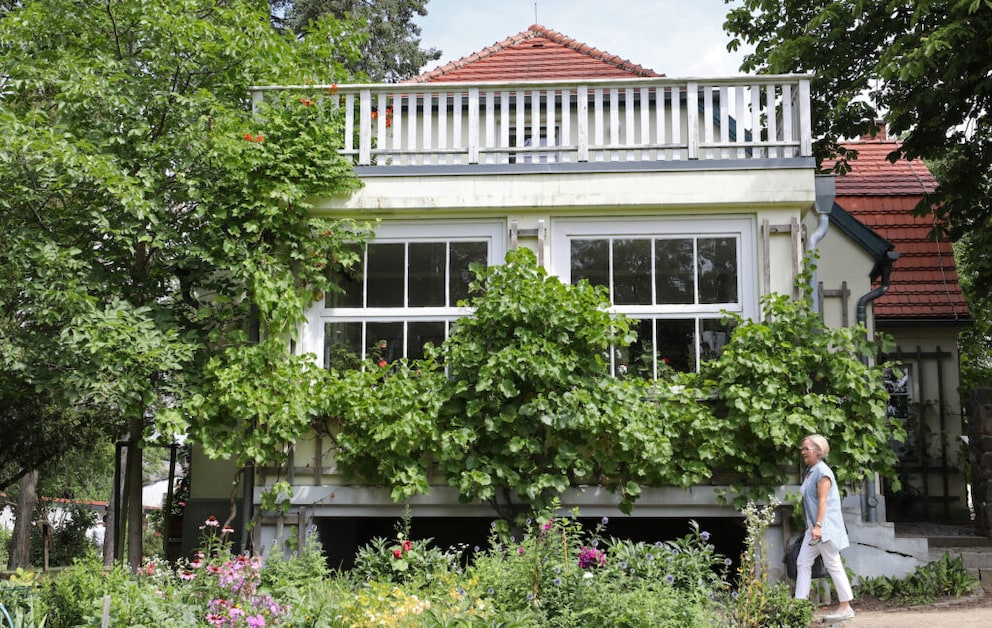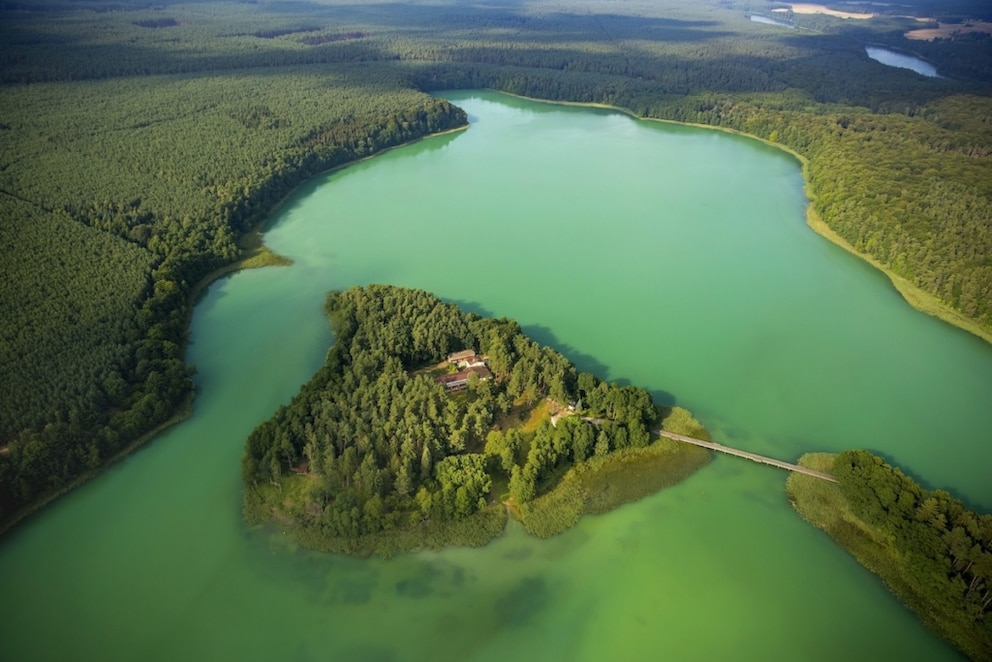July 15, 2025, 5:15 am | Read time: 8 minutes
The Feldberger Seenlandschaft in Mecklenburg-Vorpommern is a paradise for nature lovers–and not too far from Berlin or Hamburg. Here, you can find ancient beech forests, crystal-blue lakes, romantic villages, and friendly locals with a charming dialect. And with a bit of luck, you might spot the king of the skies.
The electric boat “De groot Luzin” glides almost silently over the water as a swan approaches curiously from the right. “That’s Arthur,” says Frank Berg, our captain, who is also a certified nature and landscape guide. “Arthur was left by his wife Marie–for a younger one.” Sympathetic sighs not only from the older ladies on board, as Arthur receives a few breadcrumbs from Captain Berg and the boat slowly makes its way across the Haussee, into the picturesque nature of the Feldberger Seenlandschaft.
As the name suggests, the numerous bodies of water in the nature park are its greatest treasure, bearing quirky names like Breiter Luzin, Schmaler Luzin, and Lütter See, all formed by the retreat of the Ice Age. Surrounding them are small romantic villages like Feldberg, Carwitz, and Krumbeck, nestled in the hilly, wooded landscape, where time seems to have stood still–and yet the Feldberger Seenlandschaft is only a few hours’ drive from the bustling metropolises of Berlin or Hamburg, on the border between Mecklenburg-Vorpommern and Brandenburg. Those seeking relaxation in an overwhelming natural setting can discover a picturesque paradise of forests and water here.
Also interesting: The dates for school holidays 2025 and 2026 in Mecklenburg-Vorpommern
Feldberger Seenlandschaft is rich in natural highlights
A (short) trip is best started from Feldberg, which is somewhat like the capital of the nature park: Many of the hiking and biking trails through the region start or pass through here. You can set off on an excursion boat with providers like “Boots-Berg,” or explore the numerous waters yourself with a canoe, kayak, or raft–many of them are connected by ancient small canals that once served the rafting industry, and where kingfishers often nest today. The water, especially in the Schmaler Luzin, which often resembles a river over its seven kilometers, has an almost otherworldly color created by sun-reflected lime particles. Its “big brother,” the Breite Luzin, is the second deepest lake in all of Mecklenburg-Vorpommern, at over 60 meters deep.

Also interesting: The 3 most beautiful natural wonders in Germany
Together with the many other lakes, they are home to countless fish and plant species, even the ice age fish Ostgroppe, thought to be extinct, has been found here–unique in Germany. Accordingly, the waters are a true paradise for anglers, as the stock is very good and is also preserved by the fact that many boats are only allowed to operate with electric motors. Another natural highlight is the freshwater coral, which is actually a sponge and prefers to settle around fallen trees. Due to their depth, the lakes offer a welcome refreshment for swimmers even on hot summer days, both in secluded bays in the middle of the forest and at various large and small campsites.
Landscape as inspiration
Another major asset of the Feldberger Seenlandschaft is its deep, primeval forests, which are largely left to themselves, at least around Feldberg. The most famous of these is the beech forest “Heilige Hallen,” the oldest of its kind in all of Germany, which, due to its mighty treetops, resembles a cathedral.
Also interesting: Unique ecosystems in danger! The last primeval forests of Europe
Overall, there is an unusually high proportion of deciduous trees in the forests here, inviting leisurely walks–such as the circular route from Feldberg over the Schmaler Luzin and Carwitz, which runs directly along the lakeshore and through the landscape where stones still lie that the Ice Age once dragged over from Scandinavia. A special feature on the route is the inn with the Luzin ferry, a small boat that ferries travelers from shore to shore using a hand-operated cable winch.
BILD Reisen: Discover the best hotels on the Baltic Sea coast now!
This landscape has inspired, among others, the writer Hans Fallada, who lived here from 1933 to 1944, and whose house in Carwitz is now a museum. He loved the area so much that his children had him “relocated” from a cemetery in Berlin to Carwitz after his death, where he is buried today. Feldberg itself has been a recognized Kneipp spa town since 2015, as evidenced by the spa park–here visitors can use a Kneipp bathing facility or jump directly into the water from one of the two piers. An unforgettable view can be had from the 145-meter-high Reiherberg, a viewpoint in the forest near the town, from which you can overlook the Haussee and Feldberg.

Sea eagles and water skiing
If you want to learn about nature and, with a bit of luck, observe animals, you should go on one of Captain Berg’s boat tours, which he offers daily in the summer. A reservation is highly recommended due to high demand. Berg is one of those unique characters that make the region so special: He built all his boats himself, and he knows so much about the surrounding landscape and its flora and fauna, often sharing in a charming Low German dialect, that your head will be spinning by the end. But all that is forgotten when he points into the green treetops and you spot a majestic eagle’s nest through binoculars, where the young birds are being fed by their parents.
Also interesting: 22 insider tips for vacations and excursions in Germany
You can also discover storks, geese, and a total of 140 breeding bird species. In the water, there are also otters and beavers–special piers have even been built for the former to facilitate their migration from lake to lake. In good weather, there is sometimes another attraction to admire, as Feldberg has been a cult site for water skiers since 1961: The small region, with barely 5,000 inhabitants, has already produced several world and European champions. According to locals, Captain Berg himself once had the talent for a major title, had injuries not held him back.

A unique grilling experience
Culinary delights are not lacking in Feldberg, and naturally, much revolves around the ubiquitous fish. On the Amtswerder peninsula, you can choose from several snack bars and restaurants that bring the best from the local lakes to the table–though sometimes at hefty prices. At Gasthof Tenzo, you can enjoy good cuisine with regional ingredients, though in my experience, it’s best to avoid the fish: Who needs bony imported garfish when the good stuff is so close? The restaurant garden is a lovely place to sit, but the prices here are even saltier than the already high average.
A real oddity is the turkey dinner at the rustic “Stieglitzenkrug“: In the warm season, several birds are roasted to perfection over an open fire every Saturday, and the tender meat practically falls off the bone–I’ve never had turkey as good as here, especially since the mountains of poultry are accompanied by homemade bread and salads. Fortunately, thanks to the very fair prices, you can also order an aquavit afterward to catch your breath. Be sure to reserve in advance, as the “Stieglitzenkrug” is an absolute culinary institution.
Insider tips from locals
Guests can choose from numerous affordable accommodations in the Feldberger Seenlandschaft. Google also offers a wide selection of budget-friendly campsites, some of which are right by the water. For those who prefer something more exclusive and stylish, the “Haus Seenland” hotel is an option. Apartments with plenty of wood and a great view of the Haussee await guests, and with a bit of luck, you might even spot deer with their fawns roaming through the hotel’s garden. The house also features a café and a bar-restaurant that occasionally shows sports events on a screen in the evening.

Admittedly, in the height of summer, you’re rarely alone in the Feldberger Seenlandschaft, as thousands of vacationers flock here. However, a glance at hotel prices will reveal that the high season is considered to be only July and August in many places. During our visit in May, it was anything but crowded, and another friendly local even shared his personal insider tip with us: autumn. Then, the leaves are beautifully colorful, the landscape even more romantic, and there are fewer visitors. Welcome to the Feldberger Seenlandschaft, where peace and nature are truly emphasized.
Also interesting: What to watch out for when swimming in natural waters
All important places in the Feldberger Seenlandschaft at a glance:
- Feldberg
- Carwitz
- Krumbeck
- Boat tours and rentals Boots-Berg
- Beech forest “Heilige Hallen”
- Luzin ferry at Schmaler Luzin
- Hans Fallada House in Carwitz
- Spa park Feldberg
- Reiherberg near Feldberg
- Gasthof Tenzo
- Stieglitzenkrug
- Haus Seenland

The Best Travel Tips for the Mecklenburg Lake District

8 of the Most Beautiful Swimming Lakes Near Munich



